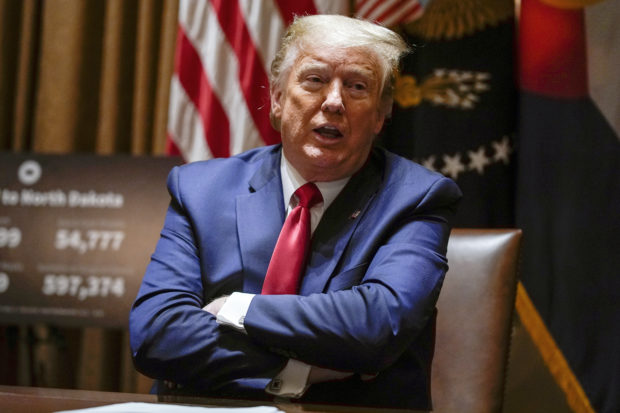WASHINGTON — President Donald Trump called on governors across the nation Wednesday to work to reopen schools in their states, pointedly taking issue with Dr. Anthony Fauci’s caution against moving too quickly in sending students back to class.

President Donald Trump speaks during a meeting with North Dakota Gov. Doug Burgum, and Colorado Gov. Jared Polis, in the Cabinet Room of the White House, Wednesday, May 13, 2020, in Washington. (AP Photo/Evan Vucci)
The president accused Fauci of wanting “to play all sides of the equation,” a comment that suggested he is tiring of the nation’s top infectious disease expert.
“I think they should open the schools, absolutely. I think they should,” Trump told reporters at the White House, echoing comments he’d made in a television interview. “Our country’s got to get back and it’s got to get back as soon as possible. And I don’t consider our country coming back if the schools are closed,” he said.
Fauci had urged caution in testimony before a Senate committee on Tuesday, although he made clear that he believes reopening decisions will likely differ from one region to the next.
“We don’t know everything about this virus and we really better be pretty careful, particularly when it comes to children,” Fauci told the committee. At one point, he told members that “the idea of having treatments available or a vaccine to facilitate the re-entry of students into the fall term would be something that would be a bit of a bridge too far.”
Fauci later clarified that he was not implying students should be barred from returning to class until a vaccine is developed. But his comments were nonetheless seized on by conservative commentators, as well as Sen. Rand Paul, a Kentucky Republican, who called the notion “kind of ridiculous.”
“To me, it’s not an acceptable answer,” Trump said of Fauci on Wednesday. He said the coronavirus has “had very little impact on young people,” although there is growing concern over cases of a mysterious inflammatory syndrome in young people that is thought to be related to the virus.
Speaking of Fauci, Trump told Maria Bartiromo in an interview for Fox Business Network’s “Mornings with Maria” that “I totally disagree with him on schools.”
In his testimony, Fauci issued a blunt warning that cities and states could “turn back the clock” and see more death and economic damage if they lift stay-at-home orders too quickly — a message that stands in sharp contrast to Trump’s push to reopen the nation as he tries to blunt the economic damage during an election year.
“There is a real risk that you will trigger an outbreak that you may not be able to control,” Fauci warned as more than two dozen states have begun to lift their lockdowns as a first step toward economic recovery.
Among those are Colorado and North Dakota, whose governors met with Trump on Wednesday.
In North Dakota, which has had fewer cases than many other states, Republican Gov. Doug Burgum allowed most businesses to reopen on May 1 with precautions that include limiting bars and restaurants to half capacity, requiring barbers and cosmetologists to wear masks and prohibiting some high-intensity fitness classes.
Burgum announced this week that schools may offer some summer programs beginning June 1 if local school officials approve and precautions are taken, such as limiting class sizes.
At the same time, cases and deaths continue to rise in the state. Health officials on Tuesday reported two new deaths from COVID-19, bringing the state’s death toll to 38. The state also reported 53 new cases, bringing the total to 1,571.
The impact on Colorado has been far worse. The state’s outbreak, which began in ski country, is now centered mostly in the Denver metropolitan area. And the state’s death toll surpassed 1,000 this week, with more than 20,000 having tested positive.
Democratic Gov. Jared Polis declared an early state of emergency and a stay-at-home directive that closed most businesses. This month, Polis began to gradually relax restrictions while warning there could be rollbacks if the virus surges.
Early in the pandemic, Polis criticized the Federal Emergency Management Agency for swooping in to purchase personal protective equipment and other supplies that Colorado, like many states, had been negotiating for with private vendors.
And he expressed frustration at the free-for-all as states competed against each other to try to buy equipment, including ventilators and especially testing kits. But more recently he’s taken a more diplomatic approach to working with the Trump administration.